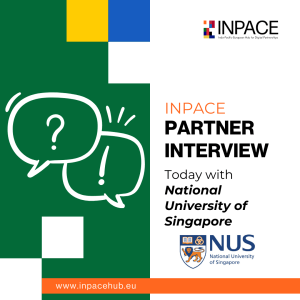
Please briefly introduce your organization.
The National University of Singapore (NUS) is Singapore’s flagship university, which offers a global approach to education, research and entrepreneurship, with a focus on Asian perspectives and expertise. We have 16 colleges, faculties and schools across three campuses in Singapore, with more than 40,000 students from 100 countries enriching our vibrant and diverse campus community. We have also established more than 20 NUS Overseas Colleges entrepreneurial hubs around the world.
What is your organization’s role in the project? What unique contribution does it bring to the team?
NUS is a good collaborator in the INPACE group and could potentially bring several unique contributions to the project, based on its strong reputation and capabilities in research, innovation, and education:
- Research Excellence: NUS is known for its cutting-edge research in various fields including engineering, computer science, and biomedicine. NUS can contribute through its expertise in areas like Artificial Intelligence (AI), cybersecurity, and Internet of Things (IoT).
- Global and Regional Networks: NUS has extensive networks with academic institutions and industries around the world. These connections can be leveraged to facilitate collaborations and knowledge exchange, and to attract global talent to the project.
- Policy Influence and Thought Leadership: NUS also contributes through policy research and thought leadership in the implementation of digital partnerships. It can offer insights into regulatory and policy frameworks that could guide the development of a conducive environment for digital innovation and trade between Asia and the EU.
How do you think INPACE will contribute to the digital landscape in the EU and Asia?
INPACE will contribute to the digital landscape in the EU and Asia with the following aspects:
- Standardization of Regulations: INPACE might work towards harmonizing digital regulations across member countries. This could include data protection standards and cybersecurity norms, making it easier for companies to operate across borders with a clear understanding of compliance obligations.
- Collaboration and Innovation: By promoting collaboration between European and Asian tech firms and research institutions, INPACE could facilitate the exchange of technological innovations and best practices. This could include areas like artificial intelligence, IoT, and green technologies.
- Investment and Funding Opportunities: The partnership could attract funding for digital startups and projects, providing a boost to entrepreneurs and innovators in both regions.
How can the EU and Asia strategically collaborate to forge impactful partnerships that foster innovation in the digital space on a global scale?
- Joint Research and Development Initiatives: Establish centers of excellence or joint labs that focus on cutting-edge technologies such as trustworthy AI, IoT, and quantum computing. These facilities could bring together researchers and industry experts from both regions to work on common projects that address global challenges.
- Funding and Investment Mechanisms: Create bilateral investment funds or co-investment platforms specifically targeted at digital innovation. These funds could provide the necessary capital for startups and scale-ups in both regions, focusing on technology transfer and commercialization of research.
- Digital Skills and Education Exchange Programs: Develop joint education programs and exchange schemes that focus on digital skills. Universities and educational institutions from both regions could offer joint degrees or certification programs in various relevant fields.
